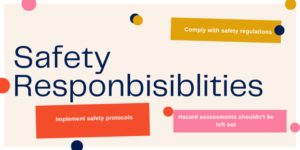Workers who are exposed to extreme heat or work in hot environments may be at risk of heat stress. Exposure to extreme heat can result in occupational illnesses and injuries. Heat stress can result in heatstroke, heat exhaustion, heat cramps, or heat rashes. Heat can also increase the risk of injuries in workers as it may result in sweaty palms, fogged-up safety glasses, and dizziness. Burns may also occur as a result of accidental contact with hot surfaces or steam.
Workers at risk of heat stress include outdoor workers and workers in hot environments such as firefighters, bakery workers, farmers, construction workers, miners, boiler room workers, factory workers, and others.
Workers at greater risk of heat stress include those who are 65 years of age or older, are overweight, have heart disease or high blood pressure or take medications that may be affected by extreme heat.
Prevention of heat stress in workers is important. Employers should provide training to workers so they understand what heat stress is, how it affects their health and safety, and how it can be prevented.
Protecting Workers from Heat Stress
Exposure to heat can cause illness and death. The most serious heat illness is heatstroke. Other heat illnesses, such as heat exhaustion, heat cramps, and heat rash, should also be avoided. There are precautions that can be taken any time temperatures are high and the job involves physical work.
Risk Factors for Heat Illness
• High temperature and humidity, direct sun exposure, no breeze or wind
• Heavy physical labor
• No recent exposure to hot workplaces
• Low liquid intake
• Waterproof clothing
Symptoms of Heat Exhaustion
• Headache, dizziness, or fainting
• Weakness and wet skin
• Irritability or confusion
• Thirst, nausea, or vomiting
To Prevent Heat Illness:
• Establish a complete heat illness prevention program.
• Provide training about the hazards leading to heat stress and how to prevent them.
• Provide a lot of cool water to workers close to the work area. At least one pint of water per hour is needed.




